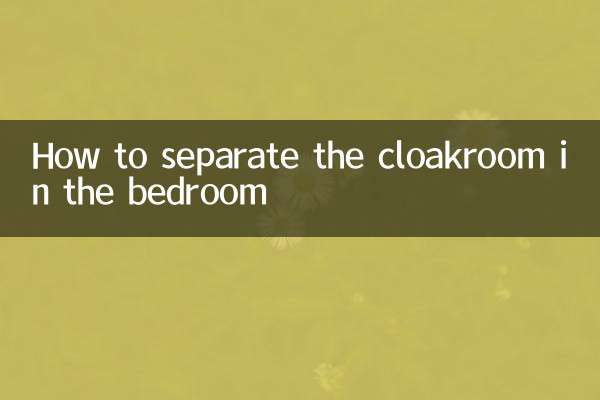How to calculate the projection area of the cabinet
When decorating or customizing furniture, calculating the projection area of the cabinet is a common requirement. The projected area not only affects the price budget, but also affects the rationality of the spatial layout. This article will introduce in detail the calculation method of cabinet projection area, and combine the popular topics and hot contents of the entire network for the past 10 days to help you better understand this concept.
1. What is the projection area of the cabinet?

The projection area of a cabinet refers to the projection size of the cabinet body on a vertical plane, usually in square meters (m2). Simply put, it is to look at the area occupied by the cabinet from the front. The calculation method of projection area varies depending on the type of cabinet.
2. Calculation method of cabinet projection area
The following are the calculation formulas for projection area of common cabinet types:
| Cabinet type | Calculation formula | Example |
|---|---|---|
| Shoud door wardrobe | Width × Height | Width 1.8m, height 2.4m, projection area = 1.8×2.4=4.32㎡ |
| Sliding door wardrobe | Width × Height | Width 2.0m, height 2.4m, projection area = 2.0×2.4=4.8㎡ |
| bookcase | Width × Height | Width 1.5m, height 2.0m, projection area = 1.5×2.0=3.0㎡ |
| cupboard | Floor cabinet length × Height + Wall cabinet length × Height | The floor cabinet length is 3m, height is 0.8m; the hanging cabinet length is 2m, height is 0.7m; the projection area = 3×0.8+2×0.7=3.8㎡ |
3. The difference between projection area and expansion area
When customizing furniture, merchants may mention two pricing methods: "expanded area" and "projected area". Here is a comparison of the two:
| Comparison items | Projection area | Expanded area |
|---|---|---|
| definition | The projection size of the front of the cabinet | Total area of all the boards in the cabinet |
| Calculation method | Width × Height | Add up all plate areas |
| Applicable scenarios | Simple cabinet body (such as wardrobe, bookcase) | Complex cabinets (such as multi-function cabinets) |
| Price transparency | Higher | Lower (requires detailed measurement) |
4. Hot topics and hot content on the entire network in the past 10 days
In the past 10 days, the calculation method of cabinet projection area has sparked widespread discussion on decoration forums and social media. Here is a summary of popular topics:
1.Is the projection area pricing cost-effective?Many netizens argue about which projection area or expansion area is more cost-effective. According to data analysis, for cabinets with simple structures, the projected area pricing is more transparent; for complex designs, the expansion area may be more accurate.
2.A pit avoidance guide for custom furniture.Popular posts mentioned that consumers should ask merchants to clearly mark the calculation method of projection area to avoid later price increases.
3.How to use the projection area to optimize space for small apartments?The designer shares cases and achieves efficient utilization of small space by accurately calculating the projection area.
5. Things to note in practical application
1.Measurement accuracy:When measuring the width and height of the cabinet, the dimensions of the actual installation position should be based on to avoid errors caused by uneven walls.
2.Additional fees:Some merchants will charge additional fees for hardware, glass doors, etc. based on the projection area, and they need to confirm the quotation details in advance.
3.Design impact:The internal structure of the cabinet (such as drawers, partitions) usually does not affect the projection area, but may increase the expansion area.
6. Summary
Calculation of the projection area of the cabinet is an important part of custom furniture. Mastering the correct calculation methods and combining the pit avoidance techniques discussed across the Internet can help you plan your budget and space more efficiently. Whether choosing projection area or expanding area pricing, clarifying needs and communication details are the key.

check the details

check the details